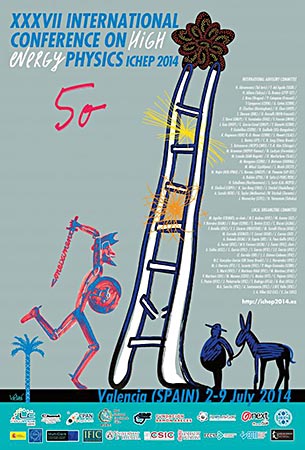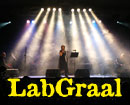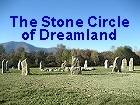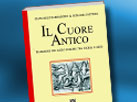
|
Image: CERN
|
CERN: Press Releases
Nearly one thousand of the most important scientists in the world will debate about the foremost topics concerning high energy physics.
Some of those attending will be François Englert, 2013 Nobel Prize in Physics for the "Brout-Englert-Higgs mechanism"-, and Alan Guth, one of the founding fathers of the cosmic inflation theory after the Big Bang, which has recently received a significant support.
CERN will celebrate its 60th anniversary with a special meeting led by its CEO, Rolf -Dieter Heuer, where the future of super-accelerators will be discussed.
June 10th 2014, Valencia
From the 3rd to the 9th of July, around one thousand particle physicists will fly in from around the world to Valencia to take part in the 37th International Conference on High Energy Physics (ICHEP), organized by the International Union of Pure and Applied Physics (IUPAP). The event, which has been held every two years for more than half a century now, is considered as a world reference in the most relevant topics of particle physics.
Among those attending the Conference will be François Englert, co-inventor of the Brout -Englert-Higgs mechanism, which explains the origin of mass and led to postulate the existence of the Higgs boson for which he received the Nobel Prize for Physics in 2013; Alan Guth, the founding father of the cosmic inflation theory which occurred moments after the Big Bang and was recently confirmed through the detection of the effects of the gravitational waves, over the polarization of the cosmic microwave background as it was stated in a study recently published by the BICEP2 experiment; the heads of the world's leading laboratories from places such as CERN, DESY, KEK, Fermilab, amongst others, will also be attending.
Despite the fact that Spain was one of the 13 founding members of IUPAP in 1922, this is the first time the conference will take place in this country. And thus, this event will greatly support the Spanish Physics discipline as a whole and, particularly, the astroparticle and particle physics communities. It also marks the 30th anniversary of Spain's return to the European Organization for Nuclear Research (CERN), which has the largest and most powerful particle accelerator in the world, the LHC (Large Hadron Collider), where the Higgs boson was discovered.
The Congress is structured with plenary, parallel and special sessions. The contents will be divided into 15 thematic areas covering the hottest current scientific issues, including those that have been receiving more attention from the media, such as neutrinos and gravitational waves generated by the Big Bang, besides the famous Higgs boson, which is known as the Brout-Englert-Higgs boson by the specialist. In the 14 parallel sessions scheduled over 500 announcements will be made, both experimental and theoretical, virtually covering all aspects of today's research.
According to Juan Fuster, CSIC Research Professor, member of the Institute of Corpuscular Physics (CSIC-U Valencia) and co-chairman of the Conference: "The most recent detailed results from experiments performed in accelerators (such as the LHC for instance) will be presented, the study of the properties of the Higgs boson and its involvement in new physics will be addressed as well as quark top and flavour physics, to help us better understand the asymmetry between matter and anti-matter. The mysterious properties of neutrinos and the secrets that they still hide will also be discussed, and the messengers that come from the ends of the universe in the form of photons, neutrinos and diverse high-energy radiation that can help us better understand dark matter, etc...”
Another issue of particular interest is the results of the BICEP2 experiment, which according to recent announcement, establish some primary evidence of the cosmic inflation process that occurred in the first moments of the universe after the Big Bang. "A presentation and discussion of the results will be held as well as the confirmation or contestation that should be provided by the European satellite Planck. This issue is to be one of the hot moments of the Conference", Fuster states.
Particle physicists speculate about the possibility to overcome the current Standard Model in the near future, which according to Fuster, "even though it explains almost all the measurements made to date in a wide variety of experimental facilities, it still leaves too many questions unanswered which suggests the need to extend and modify it. The ability of new models to overcome these difficulties, such as supersymmetry, technicolor, extra dimensions, etc.., will be contrasted with new experimental data".
During the 42 plenary sessions, a summarization of the topics addressed in the parallel sessions and a concluding summary of the conference and the future expectations of the discipline will be taken.
Among the special events there will be a session to celebrate the 60th anniversary of CERN, in which the directors of the major accelerators of the world will discuss the future of this type of machinery and will make important decisions that will affect their construction and, therefore, the knowledge of Physics for the next 50 years. There are several ongoing projects to build up new super-accelerators and CERN itself debates different initial ideas to decide and define the super-accelerator that should succeed the LHC when its expected life ends around 2030.
www.cern.ch
http://ichep2014.es
|


 -->
-->













